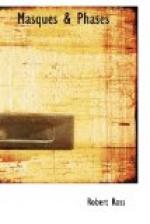‘You are sceptical at last,’ he sneered. ’I have the missing portions of the papyrus here with me. You can have them for a song. I was afraid to leave the roll too complete, lest I should invite detection. It would be a pity to let them go to some other museum. Berlin is longing for a new acquisition.’
Then he produced from his bag damning evidence of the truth of his story—deftly confected sheets of papyrus, brown with the months it had taken to fabricate them, and cracked with forger’s inks and acids—ghastly replicas of the former purchase. Nervously the Professor replaced the green cardboard shade over the lamp, as though the glare affected his eyes.
‘But how do you know I have not discovered the forgery already?’ he said, craftily. Carrel started. ’And see what I am sending to the press this evening,’ he added.
Walking to the end of the table, he picked up a sheet of paper where there was writing, and another object which Carrel could not see in the gloom, so quickly and adroitly was the action accomplished.
‘Shall I read it to you, or will you read it yourself?’
He advanced again towards the lamp, held the paper in the light, and beckoned to Carrel, who leant over the table to see what was written. Then Professor Lachsyrma plunged a long Greek knife into his back. A toreador could hardly have done it more skilfully; the bull was pinned through the heart, and expired instantaneously.
* * * * *
Now he paced the room in deep thought. For the first time he found himself an actor in modern life, which hitherto for him meant digging among excavations, or making romantic restoration for jaded connoisseurs, of some faultless work of art described by Pausanias and hidden for centuries beneath the rubbish of modern Greece. The entire absence of horror appalled him. Even the dignity of tragedy was not there. He was wrestling with hideous melodrama, often described to him by patrons of Thespian art at transpontine theatres. The vulgarity—the anachronism—made him shudder. Having till now ignored the issue of the present, he began to be sceptical about the virtues of antiquity. Antiquity, his only religion, his god, whose mangled incompleteness endeared it to him, was crumbling away. He wondered if there were friends with whom he might share his ugly secret. There was young Fairleigh, who was always so modern, and actually read modern books. He might have coped with the blackmailer alive, but hardly with his corpse. You cannot run round and ask neighbours for coffins, false beards, and rope in the delightful convention of the Arabian Nights, because you have grazed modern life at a sharp angle, without exciting suspicion or running the risk of positive refusal. There was his wife, to whom he confided everything; but she was a lady from Massachusetts, and her father was European correspondent to many American papers of the highest repute. How could their pure




